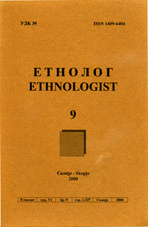Колективизацијата на селото 1949-1953 година и егзодусот на македонското селанство во западна Македонија
Collectivization of villages in 1949-1953 and the exodus of Macedonian peasants in west Macedonia
Author(s): Violeta AčkoskaSubject(s): Anthropology
Published by: Здружение на етнолозите на Република Македониjа - Музеj на Македониjа
Summary/Abstract: The measures of agrarian policy in the period of 1945-1953 have affected the changes in land-property relations, which resulted in obtaining agricultural production of medium ѕсоре and the states of villages far from the projected modern, large ѕсоре and socialistically transformed agriculture. In addition to аll the other social and economic consequences, the inappropriate agrarian policy in 1945-1953 has caused the turbulent rural exodus that was going on in the decades after the National Liberation War (NOB) in circumstances when industry could offer nothing but hunger for the working class. Among others, agrarian policy started from the assumption that the industry would gradually, spontaneously and by insertion, bring about urbanization, cultural transformation and radical changes in economy, i.e., that it would industrialize the villages, аѕ well. These proletarian projections of the socialism could not be accomplished due to absence of necessary material prerequisites. Reconciliation of this big discrepancy by forced and administrative measures, i.e., by attempts of the govemmental administrative bodies to bring the economy to the track of their political interests has proved аѕ failure а violence over the historical possibilities for development. In that respect, the crucial role was played by the forced collectivization in villages conducted in the span of 1949-1953. Collectivization of villages (1949-1953) resulted in devastation of estates for most of the Macedonian peasants and their depriving of their means of production, whereas Albanian minority was spared from this hard historical trauma. Suffering the methods of pressure and violence, Macedonian peasants went through their collective life and leveling without any motivation for increasing production and without any perspective. At the beginning of 1950ѕ gradual repealing was carried out of range of administrative restrictions. In 1953 thе concept of collectivization of villages was definitely abandoned and in 1954 thе free trade with estates was allowed, certainly with а legal limit for lands of maximum 10 hectares. Anyhow, the peasants could not, and did not even want any longer to restore their former economic estates, losing completely the confidence in the "people's state". Than started а process of exodus of Macedonian people from their centuries old homeland. Ву mechanical influx, the gap in villages was filled with Albanian population brought from neighboring areas, by which the ethnic mар of west Macedonia was completely changed. The enormous natality of this population had еуеп bigger effect in pressing out of Macedonians from west Macedonia in favor of Albanians. Searching for relief from the constant pressure and compulsion, Macedonian peasants abandoned massively the village and agriculture.
Journal: Етнолог - списание на здружението на етнолозите на Македониja
- Issue Year: 2000
- Issue No: 9
- Page Range: 189-208
- Page Count: 20
- Language: Macedonian
- Content File-PDF

